|
|
|
Sort Order |
|
|
|
Items / Page
|
|
|
|
|
|
|
| Srl | Item |
| 1 |
ID:
134293
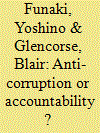

|
|
|
|
|
| Summary/Abstract |
This paper analyses anti-corruption efforts in post-conflict Liberia. It highlights citizens’ views on the definition of corruption and argues that, in the past, anti-corruption efforts have often focused on institution building and formal justice mechanisms without sufficient understanding of accountability dynamics on the ground. Anti-corruption approaches in Liberia have only nominally examined whether there is a shared understanding of what ‘corruption’ is and why it is regarded as a problem. The paper examines the social norms and perceptions that underlie understandings of the term corruption. It argues that the international community may have overlooked the fact that ‘corruption’ has become an all-encompassing term that masks a myriad of differing priorities and concerns. The authors posit that ‘accountability’ may be a more useful lens for those actors hoping to improve governance in these contexts.
|
|
|
|
|
|
|
|
|
|
|
|
|
|
|
|
| 2 |
ID:
134291
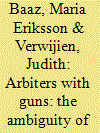

|
|
|
|
|
| Summary/Abstract |
Based on extensive field research in the Democratic Republic of the Congo (DR Congo), this article elucidates the logics, processes and readings surrounding certain ‘extra-military’ practices enacted by the Congolese army, namely the processing of various types of disputes between civilians. Exceeding the boundaries of the domain of ‘public security’, such activities are commonly categorised as ‘corruption’. Yet such labelling, founded on a supposed clear-cut public–private divide, obscures the underlying processes and logics, in particular the fact that these practices are located on a blurred public–private spectrum and result from both civilian demand and military imposition. Furthermore, popular readings of military involvement in civilian disputes are highly ambiguous, simultaneously representing it as ‘abnormal’ and ‘harmful’, and normalising it as ‘making sense’ – reflecting the militarised institutional environment and the weakness of civilian authorities in the eastern DR Congo. Strengthening these authorities will be vital for reducing this practice, which has an enkindling effect on the dynamics of conflict and violence.
|
|
|
|
|
|
|
|
|
|
|
|
|
|
|
|
| 3 |
ID:
134295
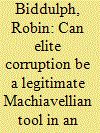

|
|
|
|
|
| Summary/Abstract |
Elite corruption may have a significant role in ending conflicts and shaping post-conflict development. This article enquires into the legitimacy accorded to such corruption. It reviews literature on post-conflict Cambodia, seeking evidence that academic commentaries, public opinion or elites themselves regard elite corruption as a legitimate Machiavellian tool for achieving other ends. Corruption has been an element of the style of government adopted by the dominant party in Cambodia, shaping both the achievement of peace and the uneven economic development that followed. Academic commentaries provide some implicit and explicit legitimation of corruption as a means to secure peace and to resist neoliberal policy settings by affording government discretionary resources and power. Meanwhile, public dissatisfaction with elite corruption appears to the most likely source of renewed violent conflict in Cambodia. How elite actors rationalise and legitimise corrupt behaviour remains poorly understood, and is deserving of more attention.
|
|
|
|
|
|
|
|
|
|
|
|
|
|
|
|
| 4 |
ID:
134287
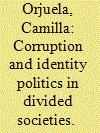

|
|
|
|
|
| Publication |
2014.
|
| Summary/Abstract |
Corruption is a major problem for populations in various parts of the world. This article argues that to understand the problems and dynamics of corruption, we need to understand how discourses and practices of corruption (and anti-corruption efforts) are intertwined with the construction and contestations of identity. Identity politics is a salient feature in peaceful political struggles, as well as in contemporary armed conflicts, which are often characterised by the politicisation of collective identity (ethnic, national, religious) for the violent pursuit of power. The article outlines and discusses four ways in which identity politics and corruption intersect. First, it points to the often blurred lines between private and collective benefit from corruption, revealing the implications of group identity for how corruption is conceptualised. Second, it shows how corruption may exacerbate grievances along identity lines. Third, it highlights how corruption can be used strategically in identity-based conflicts. Finally, it explores how corruption may encourage cross-ethnic solidarity and mobilisation that defy conflict divides.
|
|
|
|
|
|
|
|
|
|
|
|
|
|
|
|
| 5 |
ID:
134290
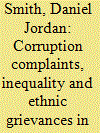

|
|
|
|
|
| Summary/Abstract |
Based on anthropological field work in southeastern Nigeria, this paper explores the public concerns and everyday experience of corruption in a society still living with the legacies of the Biafran secession attempt. The paper shows how the revival of Igbo nationalism and resentment over perceived marginalisation is fuelled by perceptions that the corrupt machinery of the federal government runs against the interests of the Igbo people, and funnels resources away from the southeast as punishment for the failed separatist struggle more than 40 years ago. Hence, complaints about corruption are used to critique the Nigerian state and other regional or ethnic groups, but they also figure in an internally focused critique by Igbos of their own complicity in Nigeria’s endemic corruption.
|
|
|
|
|
|
|
|
|
|
|
|
|
|
|
|
| 6 |
ID:
134294
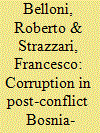

|
|
|
|
|
| Summary/Abstract |
Since the late 1990s international state builders have paid increasing attention to fighting corruption in both Bosnia-Herzegovina and Kosovo. On the surface this effort has brought significant results, since both countries have adopted legal frameworks modelled on the best practices of Western democracies. In practice, however, corruption remains rampant. This disappointing outcome has several explanations: in reviewing the empirical evidence we consider the two countries as cases involving heavily assisted transition from both socialism and war, highlighting how collusive practices between political and criminal interests have played a role in establishing formally liberal but substantively ‘hybrid’ institutions. We argue that the spread of corruption has been implicitly legitimised by international actors, who have pressured local parties to accept the formal architecture of good governance, including anti-corruption legislation, while turning a blind eye to those extra-legal structures and practices perceived as functional to political stability.
|
|
|
|
|
|
|
|
|
|
|
|
|
|
|
|
| 7 |
ID:
134285


|
|
|
|
|
| Summary/Abstract |
Corruption in the aftermath of war’ brings together an interdisciplinary group of scholars to enquire into the dynamics of corruption in post-conflict societies. This introduction discusses five themes, problematising and summarising key findings from the 10 articles included. First, we discuss the problems with the corruption concept, related to its moralising connotations and definitional vagueness, and propose viewing corruption as a collective action dilemma as a way of avoiding these moralising aspects. Second, we discuss post-conflict societies, and highlight the great varieties of ‘peace’ that that label can refer to. We suggest that the causes, dynamics and effects of corruption in post-conflict societies bear many similarities with those in other societies, but that the post-conflict situation often generates an intensification and entrenchment of corruption-related problems. Third, we analyse the dynamics between international interveners and domestic actors, and show the contradictions and tensions in international–domestic relations. Fourth, we argue that the inter-linkages between inequality, mistrust and corruption deserve consideration in the study of post-conflict societies, and that inequality in particular merits more attention. Finally, we discuss some methodological challenges encountered by the contributors in their studies of corruption in post-conflict societies.
|
|
|
|
|
|
|
|
|
|
|
|
|
|
|
|
| 8 |
ID:
134296
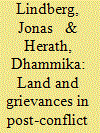

|
|
|
|
|
| Summary/Abstract |
There is a growing academic literature on both land and corruption in relation to post-conflict peace building. This paper aims to understand what role corruption complaints play in the nexus between land and grievances in post-conflict societies. Drawing on field material collected in Sri Lanka, the paper interrogates the role of corruption complaints in relation to a number of highly politicised and ethnicised post-conflict land issues, ranging from the return of idps and alleged new resettlement schemes to land grabbing for military, ‘development’ and/or commercial purposes. The comparatively high visibility of land use, and the fact that land-related corruption is likely to affect a specific set of people who lay claim to the land, makes it a particularly important area to address in research on corruption and post-conflict peace building.
|
|
|
|
|
|
|
|
|
|
|
|
|
|
|
|
| 9 |
ID:
134288
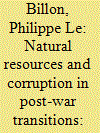

|
|
|
|
|
| Summary/Abstract |
Many ‘post-conflict’ countries face difficulties in reaping the full benefits of their natural resource wealth for reconstruction and development purposes. This is a major issue given these countries’ needs and the risk of seeing ‘mismanaged’ primary sectors undermine a transition to peace. Bringing together debates about the ‘inequality-mistrust-corruption’ trap and relationships between natural resources and corruption, this paper suggest that some resource sectors may be more likely to foster inequalities, and thereby increase corruption and distrust, while others are less likely to do so. Reviewing arguments and empirical evidence, I point to the relative importance of transition contexts, stakeholder incentives and resource sector characteristics, and suggest how resource-related corruption may be better understood in relation to trust-building and reconciliation processes
|
|
|
|
|
|
|
|
|
|
|
|
|
|
|
|
| 10 |
ID:
134292


|
|
|
|
|
| Summary/Abstract |
This study explores the relationship between corruption and conflict in northern Uganda, using the perspectives of local business owners as an inroad. The purpose is to highlight how various types of corruption can be related to conflict dynamics in different ways, depending on the context. The article argues that in post-war northern Uganda grand corruption can be seen as related to the conflict dynamics, while petty corruption is generally not seen that way. At the centre of the conflict in northern Uganda lies a deep mutual mistrust between the population in the north and the central government. Therefore corruption in the public sector that occurs at the central level, in particular with regard to funds aimed at the north, tends to be associated with the conflict, whereas the various types of petty corruption encountered by local businesspersons in Gulu, the largest town in northern Uganda, are seen by these actors as normal or as ‘the way things are’.
|
|
|
|
|
|
|
|
|
|
|
|
|
|
|
|
| 11 |
ID:
134286
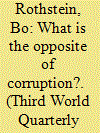

|
|
|
|
|
| Publication |
2014.
|
| Summary/Abstract |
Corruption has turned out to be difficult to define and what should be counted as the opposite to corruption remains widely disputed. If the goal for a post-conflict society is not only to become democratic and prevent a return to violence but also to reduce systemic corruption, we need to know what it is that should be fought and how the opposite to systemic corruption should be conceptualised. To define the opposite to corruption, choices have to be made along four conceptual dimensions. These are universalism vs relativism, uni- vs multidimensionality, normative vs empirical and whether the definition should relate to political procedures or policy substance. As a result of this conceptual analysis, it is argued, a universal, one-dimensional, normative and procedural definition should be preferred. The suggested definition is that of impartiality as the basic norm for the implementation of laws and policies. This conceptual analysis ends with a discussion of why such a norm has historically and in the contemporary world been hard to achieve and why it is especially problematic in post-conflict societies.
|
|
|
|
|
|
|
|
|
|
|
|
|
|
|
|
|
|
|
|
|